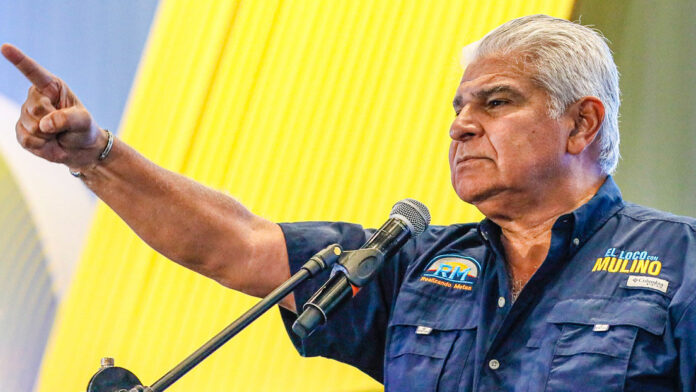In his speech after learning of the victory, he said that he will promote a “pro-investment” and “pro-private business” government. He promised to stop migration through the Darien
by the El Reportero wire services
José Raúl Mulino Quintero, a 64-year-old lawyer, was elected president of Panama in the elections that were held last Sunday in the Central American country.
“It implies an enormous weight on my shoulders that I receive with pleasure and above all with the firm and unwavering conviction of giving the best of myself for the country during the next five years,” Mulino said Sunday night, after the Electoral Court confirmed his victory.
According to the results issued by that organization, with 99.04 percent of the votes counted, Mulino reaches 34.28 percent of the votes, a total of 772,619 votes. Of his opponents, the one closest to him is Ricardo Lombana, who gets 24.68 percent (556,387).
After this triumph, the now elected president, married with four children, will take office on July 1, for the presidential period 2024 – 2029; thus replacing Laurentino Cortizo.
From former minister to president
Mulino, from the Alliance to Save Panama, was the last of the candidates to join the race, since he replaced Ricardo Martinelli, the former president who governed the Central American country between 2009 and 2014 and who was seeking power again.
Martinelli was disqualified in early March by the Electoral Court after being sentenced to almost 11 years in prison for money laundering and requested asylum at the Nicaraguan Embassy.
Then, Mulino, who was a vice presidential candidate for the coalition, was authorized by the organization to replace the former president and his candidacy was declared constitutional by the Supreme Court of Justice (CSJ) of Panama only last Friday, May 3.
Mulino entered politics when he was part of the ‘civilist crusade’, a movement that integrated various sectors of Panamanian society against the military regime that existed between 1968 and 1989.
Later, he held several political positions. He was vice minister of Foreign Affairs between 1990 and 1993 and then became chancellor, from that year to 1994, during the administration of President Guillermo Endara (1989-1994).
He returned to the Executive in 2009, in the Martinelli Presidency, when he was Minister of Government and Justice from July of that year until the same month of 2010; and, later, he held the Public Security portfolio, between April 2010 and June 2014.
As head of Public Security, he implemented heavy-handed policies, including the repression of citizen protests. During demonstrations in the province of Bocas del Toro in 2010, two people died and dozens were injured; After that, the State had to respond to the victims with lifelong pensions.
Once he left office, he spent six months in preventive detention for a case of alleged embezzlement in the Government; but the case was annulled.
Proposals
During his speech on Sunday, Mulino, Martinelli’s political dolphin and who defines himself as center-right, made it clear: “This person here is no one’s puppet.”
However, on several previous occasions—including the electoral campaign—he said that he plans to help Martinelli with his judicial process, since he believes that the conviction against the former president was due to unjust political persecution.
The president-elect, who has a university degree in law and political science and a master’s degree in maritime law in the US, also said in his speech on Sunday that he will promote a “pro-investment” and “pro-private business” government.
“We cannot forget those who are hungry, those who want a job and those who need clean water throughout the country,” he added.
Mulino has promised to apply policies to stop the growing flow of migrants entering the country through the Darién jungle, which connects with Colombia, heading to the United States. He also proposed expanding the capital’s metro that was inaugurated in 2014 by Martinelli and a train between Panama City and the interior of the Central American nation.
Alfonso Fraguela, former vice president of the National Bar Association of Panama, commented, in an interview with RT, that among the main problems that Mulino will have to face is the drought in the Panama Canal, as well as that of the Social Security Fund, which has financial problems.
“He will also have to recompose the image of the country as a brand, since in recent administrations our country has been questioned by aspects concerning the famous ‘Panama Papers’ and a series of situations,” he said.



